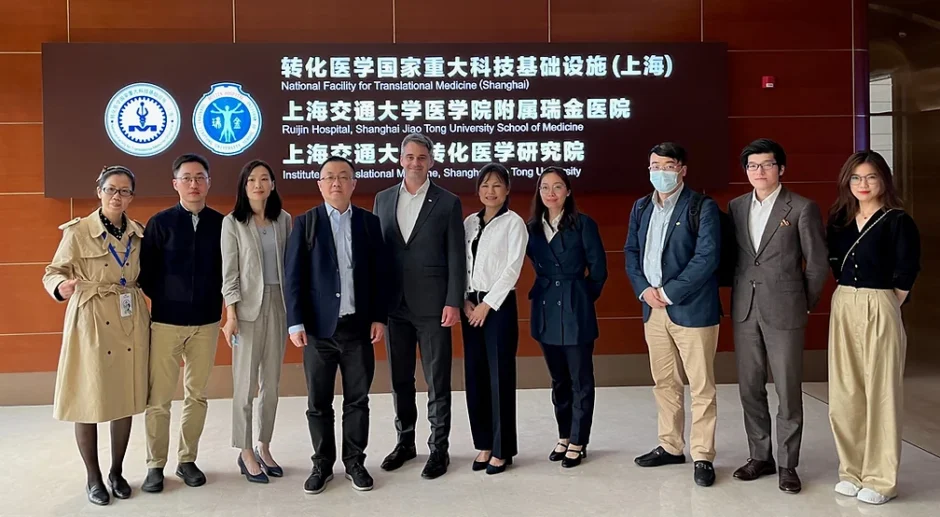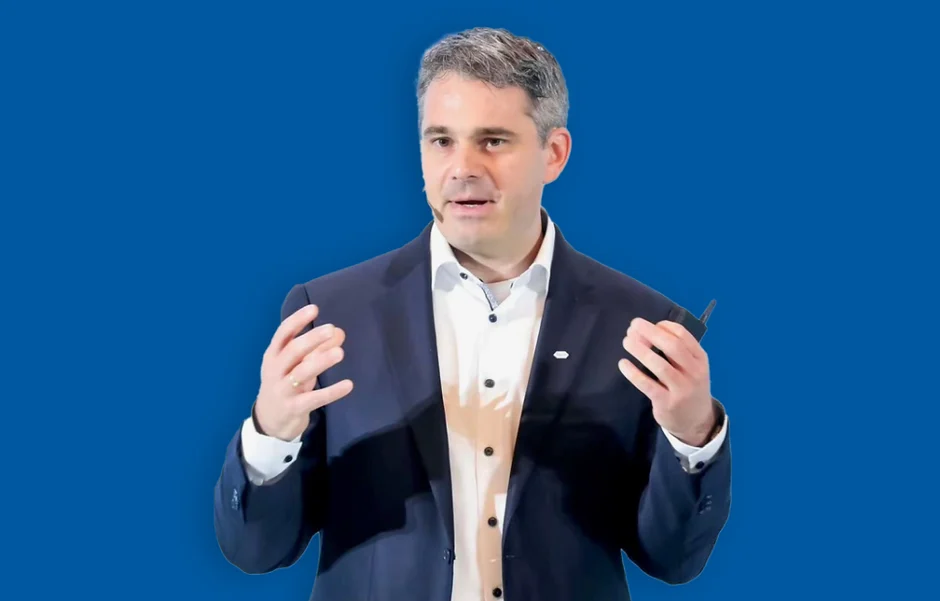Dr Peter Ahnesorg, Global Hematology Franchise Head, Roche, talks to GOLD about his background in biochemistry, his hopes for the haematology space and his approach to leadership
Interview by Isabel O’Brien
When I speak to Dr Peter Ahnesorg, his passion for developing and delivering life-changing medicines is clear. A biochemist by training, with a PhD from the University of Cambridge, he had a promising career in research before deciding that life in the lab wasn’t for him.
In the early 2000s, Ahnesorg moved into industry, taking a job at Roche. He has now been with the company for 17 years. Why is the industry the right place for him? “I like translating scientific advances into progress for patients,” he says. As Roche’s Global Hematology Franchise Head, he oversees a portfolio of around 20 medicines for malignant and benign blood disorders from Roche’s Swiss headquarters in Basel.
When I ask Ahnesorg how he likes his life in Switzerland, he says he has a great deal of love for his adoptive home. Originally from Germany, he says: “I love living in Switzerland because I love the outdoors.” What’s on the menu? A mix of cycling, skiing and running.
Not only does the Swiss outdoors keep Ahnesorg fit, healthy and focused, but it helps him be a strong leader for his team. He strives to be “creative, thoughtful and inspiring” for his people. Values that he tries to embody in every aspect of his leadership.
When did you first discover your love of science?
As is often the case with these things in life, it was a role model for me. I grew up in a very rural, non-academic household, but I had a chemistry teacher at high school who wanted to find young people interested in science. He ran an extracurricular chemistry club with a very high entry bar – there was an exam you had to pass to get in. That club and the competitiveness absolutely hooked me on chemistry and science at that time.
This led me to study biochemistry, but I would say that I only properly understood science later. I had the opportunity to do a Master’s in Cambridge. Then, I worked at the Cancer Research UK Institute with inspiring scientists like John Gurdon, Stephen Jackson and Tony Kouzarides. Only then, I think, did I really understand the power of biotechnology and what science can ultimately achieve. So, it was a journey that started early, then got richer along the way.
Why did you decide to take up a job in the pharma industry?
It was pure serendipity. I realised at the end of my PhD that I was never going to be the greatest academic researcher in the world. I missed interacting with people and, frankly, I don’t get the same energy from going narrow and deep as I do from going broad. So, like many people at this stage in their scientific careers, I didn’t really know what to do.
My luck was that I happened to meet someone from Roche. They said you’re still young, why don’t you come and do a traineeship with us and find out what the industry is all about? And the opportunity to see a wide range of roles in the pharmaceutical industry, rather than going straight into a job, was something that really intrigued me.
Now, 17 years later, I am so grateful for that journey. Along the way, I worked for Genentech in the US, where I helped to build a sales team from scratch to launch a skin cancer drug. I was also the lifecycle leader on the team at Roche that launched the first drug for liver cancer. It’s been a rich and rewarding journey since that traineeship.
What is a typical day like as Global Hematology Franchise Head at Roche?
One of the things I enjoy most is that no two days are the same. I’m based in Basel, but we have teams in China, the US, Canada and the UK. So, I spend a lot of time interacting with people all over the world. I also manage a broad portfolio of on-the-market medicines and more than 10 assets in development. My teams work closely with R&D to make decisions about what to move forward, what to prioritise and where to invest. I also have the privilege of working with a phenomenal leadership team from whom I learn every day.
Besides our internal teams, I try to spend time with our customers. I talk to experts in haematology and listen to what they need. I’m doing the same with patient organisations to find out what they want from us and how Roche can meet their expectations. Finally, I work with our external biotech partners. There’s a lot of amazing innovation happening outside Roche, so I spend a lot of time building new partnerships.

What do you see as the biggest challenges and opportunities in haematology today?
First of all, haematology is incredibly diverse. It covers all kinds of blood disorders, some of which are malignant. Others are more chronic or genetic, such as haemophilia, so the challenges and opportunities vary.
However, one overarching challenge is to ensure that patients have access to medicines. I am deeply concerned about current developments in Europe, particularly where countries are introducing new legislation on medicines that could make it harder for patients to access innovative therapies or stall R&D. At Roche, our priority is to ensure that we can continue to advance science and bring new treatments to those who need them. To continue this journey, we need a supportive environment for biotechnology in Europe.
We were initially very cautious when the first wave of cell therapies came along
The opportunity I’m most excited about are the novel technologies we’re bringing to patients. For example, CAR T technology. We were initially very cautious when the first wave of cell therapies came along because we didn’t see a sustainable way to scale autologous CAR T technology. After all, you always have to take cells from a patient, modify them and then give them back to the patient. It’s fascinating scientifically, but it can be challenging logistically.
Then, last year we partnered with Poseida Therapeutics on allogeneic technology. This [process] takes cells from healthy donors, modifies them in a factory on a large scale and then delivers them to patients just like any other infused therapy. I’m really excited about this advance because it’s an example of how you can bring novel solutions, in this case cell therapy, to many more patients around the world.
What role do you want Roche to play in the future of haematology?
Our ambition is to cure more patients with blood disorders. When I was at primary school, two out of 10 patients with diffuse large B-cell lymphoma were cured. Now, also thanks to innovation from Roche, we cure seven out of 10. We want to see more examples like this in other haematological diseases. That’s what every patient is hoping for. You’re not hoping to manage a disease. You’re hoping to be cured. That’s the progress we’re making in terms of understanding biology and science, which is getting us closer to that ambition every day.
In terms of access, we work hard to make our therapies available, but it can be difficult to get reimbursement for innovation – especially cutting-edge innovation – depending on the healthcare system. So, Roche is investing in maturing healthcare systems, particularly in the developing world to build a future where more and more patients have access to treatments for their diseases. We’re also trying to make our drugs available through charitable organisations, such as the World Federation of Hemophilia, where that is an option.
In specific diseases, we’re also actively researching disease modifying oral drugs that will be much better at addressing disease in the developing world compared to more complex technologies such as gene therapy. These may be amazing, but even in the medium term it will be difficult to make them viable in many parts of the world.
How do you think you have evolved as a leader over the course of your career?
What I have enjoyed the most in my 17 years at Roche is that I’ve never had to be someone I’m not. The organisation has always encouraged me to be my authentic self, but I don’t think I am done learning to be a leader. It is a continuous journey. I have this hunger to improve and watch other leaders around me. That’s a big part of the leader I try to be.
I have this hunger to improve and watch other leaders around me
But overall, my leadership style can be traced back to a pivotal event in my career. I had just started leading a team at Genentech and I had my first one-on-one with my manager. We were launching a new drug in the US and there was a lot of pressure. High stakes and high expectations. I was ready to talk about the business and what we were doing to ensure success. I sat down in the chair and my manager said: ‘So, Peter, tell me how your people are doing?’ And I was completely surprised.
That lesson has stuck with me throughout my career. As a leader, it’s all about your people, and that’s something I’ve prioritised ever since. If you have a great team of motivated people, you can do almost anything. That’s the mission we should be on as leaders. Finding the right people, creating the right environment for them and giving them the right guardrails to be as creative, expansive and powerful as they can be.









